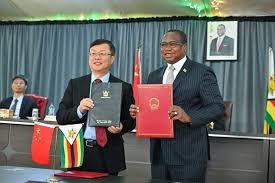News / National
Zimbabwe, China seal US$55m technical cooperation agreement
2 hrs ago | Views

President Emmerson Mnangagwa on Wednesday presided over the signing of a US$55 million Economic and Technical Cooperation Agreement between Zimbabwe and China, in a move set to boost the country's development agenda through the funding of key programmes and projects.
The two countries also signed Exchange Letters for Food Assistance valued at US$6.9 million, further deepening the long-standing diplomatic and economic ties between Harare and Beijing.
The agreements were signed at State House by Zimbabwe's Finance, Economic Development and Investment Promotion Minister Professor Mthuli Ncube and China's Ambassador to Zimbabwe Zhou Ding, in the presence of President Mnangagwa.
Speaking at the ceremony, Prof Ncube described China as Zimbabwe's "all-weather friend," highlighting the significance of the new agreements.
"Today, we sign an Economic and Technical Cooperation Agreement worth RMB Yuan 400 million (approx. US$55 million) to finance programmes and projects to be agreed by the two parties," said Ncube.
"We also sign Exchange Letters worth RMB Yuan 50 million (approx. US$6.9 million) for Food Assistance in the form of white rice."
The Finance Minister said the new support package builds on a legacy of cooperation, citing a similar agreement signed in 2020 worth US$41.4 million and emergency food assistance provided in 2023 valued at US$4.1 million.
Ncube also noted China's contribution to major infrastructural projects in Zimbabwe including the Hwange Units 7 and 8 power expansion, Kariba South Hydro Power Station Extension, Robert Gabriel Mugabe and Victoria Falls Airport expansions, the New Parliament Building, and the National Pharmaceutical Warehouse.
"On behalf of the Government of Zimbabwe, I would like to sincerely thank the People's Republic of China for the continued support towards the people of Zimbabwe," he said.
Ambassador Zhou reiterated China's commitment to supporting Zimbabwe's development efforts, especially in the face of continued Western sanctions.
"Since the inception of the Second Republic, we have joined hands to complete many landmark projects. Each project represents a building block in Zimbabwe's journey towards industrialisation and modernisation," said Zhou.
He noted that China remains Zimbabwe's largest investor, with cumulative investments exceeding US$4 billion, including over US$500 million in 2024 alone. Bilateral trade between the two nations surged to US$3.8 billion this year, marking a 24% year-on-year growth.
Zhou also highlighted China's new zero-tariff policy for African imports, which includes Zimbabwe, calling it "an unprecedented step in international relations."
Delivering the vote of thanks, Deputy Finance Minister Kudakwashe Mnangagwa said the agreements were a timely boost for Zimbabwe's economic trajectory.
"These agreements will go a long way in enhancing Zimbabwe's economic growth and development," he said. "I would like to extend my sincerest gratitude to the People's Republic of China for their commitment to strengthening our bilateral relations."
The latest agreements reaffirm China's position as a key partner in Zimbabwe's pursuit of Vision 2030—its ambition to become an upper middle-income economy within the next five years.
The two countries also signed Exchange Letters for Food Assistance valued at US$6.9 million, further deepening the long-standing diplomatic and economic ties between Harare and Beijing.
The agreements were signed at State House by Zimbabwe's Finance, Economic Development and Investment Promotion Minister Professor Mthuli Ncube and China's Ambassador to Zimbabwe Zhou Ding, in the presence of President Mnangagwa.
Speaking at the ceremony, Prof Ncube described China as Zimbabwe's "all-weather friend," highlighting the significance of the new agreements.
"Today, we sign an Economic and Technical Cooperation Agreement worth RMB Yuan 400 million (approx. US$55 million) to finance programmes and projects to be agreed by the two parties," said Ncube.
"We also sign Exchange Letters worth RMB Yuan 50 million (approx. US$6.9 million) for Food Assistance in the form of white rice."
The Finance Minister said the new support package builds on a legacy of cooperation, citing a similar agreement signed in 2020 worth US$41.4 million and emergency food assistance provided in 2023 valued at US$4.1 million.
Ncube also noted China's contribution to major infrastructural projects in Zimbabwe including the Hwange Units 7 and 8 power expansion, Kariba South Hydro Power Station Extension, Robert Gabriel Mugabe and Victoria Falls Airport expansions, the New Parliament Building, and the National Pharmaceutical Warehouse.
Ambassador Zhou reiterated China's commitment to supporting Zimbabwe's development efforts, especially in the face of continued Western sanctions.
"Since the inception of the Second Republic, we have joined hands to complete many landmark projects. Each project represents a building block in Zimbabwe's journey towards industrialisation and modernisation," said Zhou.
He noted that China remains Zimbabwe's largest investor, with cumulative investments exceeding US$4 billion, including over US$500 million in 2024 alone. Bilateral trade between the two nations surged to US$3.8 billion this year, marking a 24% year-on-year growth.
Zhou also highlighted China's new zero-tariff policy for African imports, which includes Zimbabwe, calling it "an unprecedented step in international relations."
Delivering the vote of thanks, Deputy Finance Minister Kudakwashe Mnangagwa said the agreements were a timely boost for Zimbabwe's economic trajectory.
"These agreements will go a long way in enhancing Zimbabwe's economic growth and development," he said. "I would like to extend my sincerest gratitude to the People's Republic of China for their commitment to strengthening our bilateral relations."
The latest agreements reaffirm China's position as a key partner in Zimbabwe's pursuit of Vision 2030—its ambition to become an upper middle-income economy within the next five years.
Source - The Herald








































